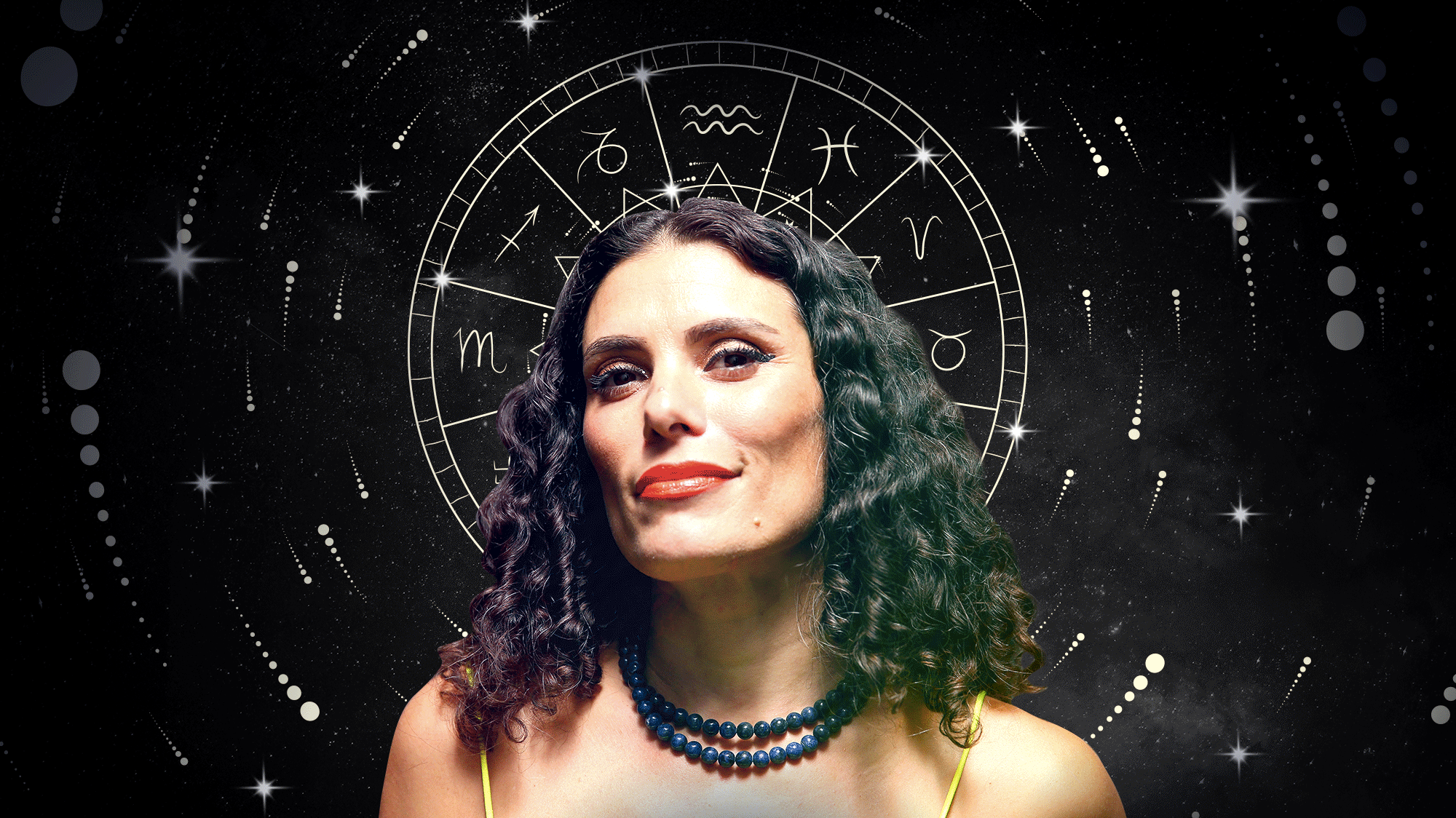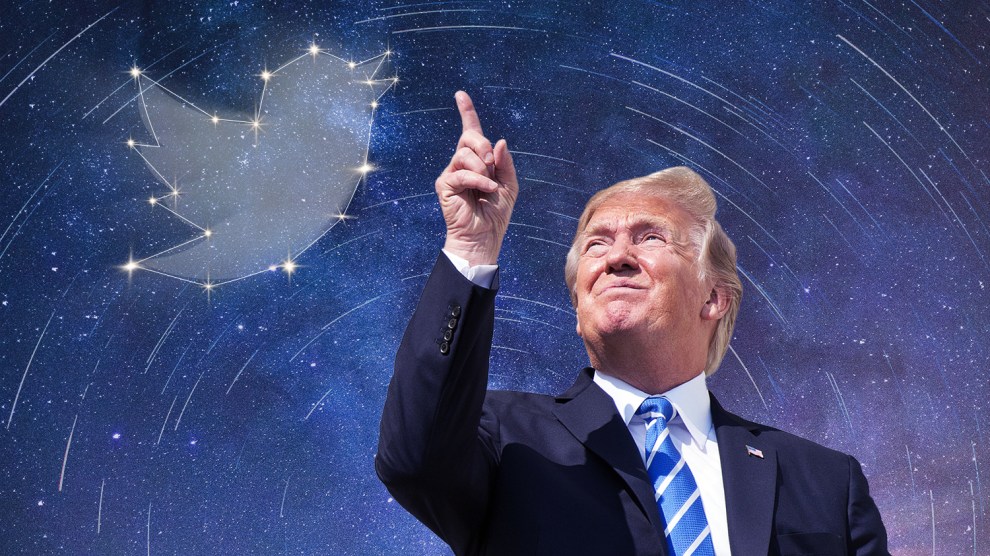I’m munching nervously on this hotel’s gourmet gummy bears, and I keep wondering when she’s going to do it. This is embarrassing. I don’t know how to ask, and now things are weird. I’m treading water, struggling with what to say next to Chani Nicholas, the sort-of-famous astrologer, whose impressively high cheekbones suggest that if the stars had aligned differently, she might have been an actress or a model. Instead, on this Friday in late January, she is posted across the table from me in a midtown Manhattan hotel lobby, talking to me about the zodiac.
It’s a very different vibe from Monday, when Chani (it rhymes with Annie) held the packed audience of the 92nd Street Y in rapt attention. I don’t think I looked at my phone for a full hour. But now Chani is the talent—and also the subject. Gone is her control from Monday night, the popular high school art teacher vibes. In oversized black reading glasses she sat on stage in an oversized beige chair with a small stack of papers spilling across her lap, her shoulder-length brown curls bouncing excitedly as she shook her head in recognition, reading the astrological chart of her friend, the filmmaker and Women’s March co-founder Paola Mendoza.
She’s swapped Monday’s black satin jumper and strappy black flats for a red-and-black plaid shirt and some chunky black boots. She’s wearing hoop earrings with her hair pulled tightly back, giving off a faint chola vibe, minus her blue-and-green socks spotted with what look vaguely like vaginas. “They are definitely queer socks,” she later laughs.
In the lobby, she’s predictably warm as she answers my questions about the book tour she just started for You Were Born for This: Astrology for Radical Self-Acceptance. We do a stilted who’s-who guessing game of mutual friends, the small, overlapping worlds of queer Bay Area and Brooklyn. (Though she’s based in Los Angeles, she, like me, spent a chunk of her young adulthood in San Francisco.)
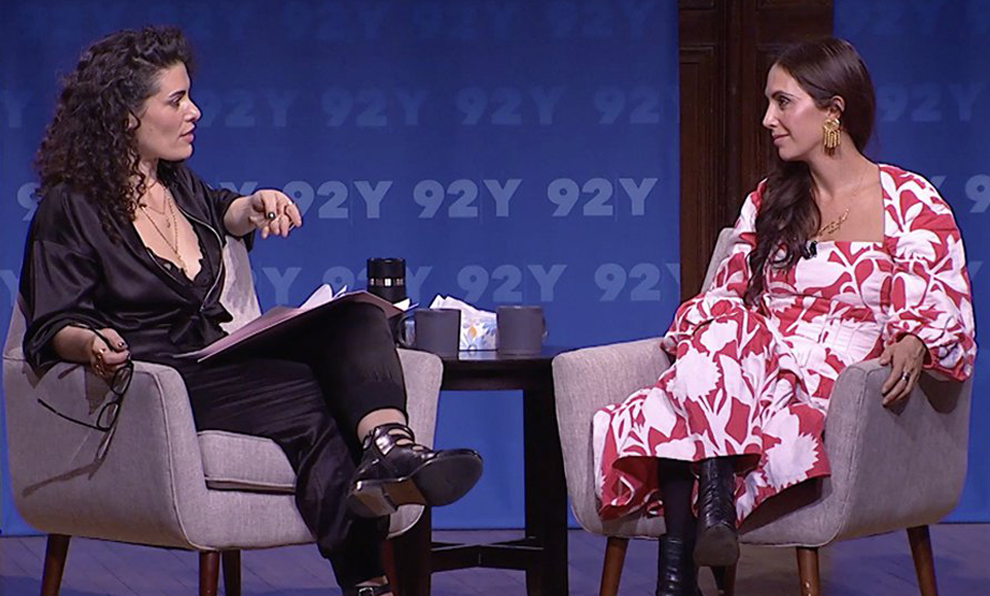
Chani Nicholas reads the chart of filmmaker Paola Mendoza in January.
Courtesy 92Y
I had been struck on Monday night by how intimate the conversation was about Mendoza’s life, based on how the stars were aligned at the moment she took her first breath. Her life story, according to her chart, existed almost before she did. The two asteroids in her first house presaged the mother-daughter relationship that would be the focus of her first film; her sun being in Sagittarius and ruled by Jupiter helps explain the work she’s done collecting migrant women’s horror stories on the border. Her moon being in Leo and the fourth house means that she likely has had a hard time receiving attention and praise. And, wouldn’t you know it, she studied acting in undergrad before finding a more comfortable spot behind the camera.
I’d found myself nodding along. She was using the stars to describe the alignments of a personality. It turns out there’s something about hearing about someone’s past that makes you more willing to show up for the collective present.
I share with Chani an observation that all of her public appearances to date have been astrological readings. Maybe it’s strategic? A way to change up the power dynamic between interviewer and subject?
She seems taken aback for a moment and then insists it’s her way of democratizing astrology for people, particularly those who may think of astrology as something just short of whitewashed witchcraft. “I’m hoping to use astrology as the context for the interview,” she says, “to see what story comes out when they get that prompt, because really our chart is a whole series of prompts.”
I think about how her publicist actually promised my own astrological reading, and I’m surprised at how embarrassed I am to admit that I really want it. Would it be too much of an imposition to ask for it? I wonder. Would it make me any less of a journalist? Why am I so desperate? Do I believe any of this? Why am I so scared? I already know I’m a Leo, and I know all the tropes; I’ve even jokingly deployed the Zora Neale Hurston quote—“how can any deprive themselves the pleasure of my company”—in conversation. But I (perhaps like Chani) actively avoid being the subject. And while I don’t always prefer it, I’m inclined to be somewhat solitary, at home with my animals (including my dog named, obviously, Zora).
That’s when our podcast producer, Molly, who’s there with me, says with a smile: “We thought you were gonna read Jamilah’s chart.” And then Chani responds like I’ve asked her for a stick of gum. “Oh! Why didn’t you say anything?” she laughs. “That’s easy, let me get my phone.”
She starts and matter-of-factly reads my chart. It takes only a few minutes before she breathes in and tells me my Leo is in a house associated with grief. And now I’m like, Shit, did she Google me?

You probably live in one of two worlds: In one, you’ve literally never heard of Chani Nicholas. In the other, you’ve seen her everywhere over the past few months. In the New York Times, Vogue, Glamour. On Twitter, where she maintains a lively, favorite-aunt presence. On Spotify, for the legions who listen to her popular astrological playlists every month. With her first book—part self-help workbook, part astrology 101 explainer—out in January. Maybe you saw an Instagram post of hers, like the one earlier this month, put up the day after the coronavirus was deemed a pandemic, that gently implored people to “Listen to and learn from folx that have lived with disability and chronic illness,” and to “Stay in touch with your loved ones, stay as relaxed as possible, stay in joy whenever and for however long you can,” and to “Wash your hands.”
In this world, Chani is officially having her moment.
Of course, so is astrology. In the United States, astrology has gone through waves of popularity, most recently in the 1970s. It then receded a bit, as with most other things considered New Age, though astrology has come back in a serious way in the past decade. Still, with only a few well-known exceptions like Puerto Rican astrologer Walter Mercado, reading the stars has often been more closely confined to with witchy white women with decidedly apolitical stances.
Chani Nicholas is not that type of witchy white woman.
The day before we meet, she sat on a stage at the Brooklyn Museum with a filmmaker and queer activist named Tourmaline and read the charts of Marsha P. Johnson and Sylvia Rivera, two pioneering transgender activists whose contributions Tourmaline has helped unearth. “It’s just it’s so poetically potent in terms of the work that [Tourmaline] does,” Chani tells me about doing those readings. “Because it really is about working with folks that are left out of the system or incarcerated or criminalized because of who they are. And it has so much to do with that sense of being a different kind of woman or gender or representation or what have you.”
This is the type of thing that makes me cringe a bit. It sounds nice, it’s certainly the right thing to say, but it also feels so…predictable. In fact, everything around astrology makes me roll my eyes sometimes; at a certain point it feels like a game of logical propositions (if this is true then this and this). But I have to say, it feels different with Chani. And maybe that’s by design—she appeals to a very specific crowd. It’s a crowd that’s populated by coastal queer activist-types who likely saw one of her motivational quotes while scrolling through Instagram. They are optimistic but endlessly critical people, the kind who avoid saying Trump’s name out loud like he’s Voldemort (“45” is fine) but are quick to point out that President Obama deported a record amount of people, too. They talk endlessly about the importance of chosen family, are in a constant negotiation with their historical trauma, and would rather you not use assigned gender markers with their children. Everything is a construct—race, class, gender—and if you challenge this, they will probably instruct you to read Toni Morrison’s Playing in the Dark: Whiteness and the Literary Imagination. In fact, they might even offer to loan you the worn copy that sits dusty but centrally located on their bookshelf. The current state of our country’s divisive and polarized and toxic political climate isn’t an anomaly, they argue, but merely a predictable next chapter for a nation that has relied too heavily too often on piecemeal change. Yes, We Can—but if you’re not asking why, you’re not really doing any meaningful work.
If you can’t already tell, I know these people well. They might just be me.
So I admit, after hearing about Chani and her socially conscious strain of star reading, I wanted to know more not just about her but about the brand she’s built into something of a juggernaut—one that has apparently filled some unaddressed need, bringing together a notoriously fickle audience of activists and organizers and social justice–minded folks who agree on absolutely nothing, except, apparently, her. Her followers include Chase Strangio, the ACLU attorney who famously represented Chelsea Manning, along with Black Lives Matter co-founder Alicia Garza and MacArthur “genius” award winner Ai-jen Poo, who affectionately called her “Chan-Chan” on their new podcast. They also include plenty of frontline organizers I’ve met over the years reporting on racial justice. Chani’s rise represents the extent to which a generation raised on Obama-era platitudes has gone to reimagine hope. It’s angry but actionable. And in an era when we can’t stop talking about the importance of self-care but do very little beyond follow some (mostly white, affluent) influencers, Chani’s work is now anchoring the hope, the motivations, and the work of (mostly young, progressive, Black and Brown) people who are reaching for something a little extra to get through the Trump presidency and all the ugliness and division, even on the left, that’s come with it.
When I first connected with Chani, I’d wanted to talk to her about these people, about how they’d found in her astrology a language for addressing their thwarted hope. A few months later, a pandemic gripped the world, and the questions at the heart of her work became more urgent, not just for the activist set but for everyone. How do you heal yourself without losing sight of all the things in the world that need healing?

“I don’t think there’s an astrologer out there that didn’t look at this year and swear under their breath a little bit,” Chani tells me, “because it is a year that is just stacked with one challenging astrological setup after another.” It’s Monday, and Chani is explaining just what in the possible hell this moment is that we’re living in.
“One of the main themes of the year is Mars. The first part of the year and then the second half of the year, Mars is very highlighted in the astrology in a very challenging way. And Mars does things like create aggravation, is the god of war, is related to heat and inflammation and fears and things that get damaged from excessive temperatures. And so right now, what’s happening is Mars is about to make a conjunction with Saturn. And Saturn is the opposite of that. Saturn is cold and withholding, and Saturn creates boundaries and barriers and structures and quarantines and isolation.
“It feels eerie to be living at a moment that is about those two very things and those planets are making a conjunction on March 31, and so that seems to be us moving towards the most difficult point. I’m not saying that’s it, because Mars also makes really difficult aspects come September and October and November—haha—so I thought it was going to be much more about the election, which it still probably will be, but I didn’t expect it to be this challenging up front.”
She’s calm as she lays all this out for me, and in a weird way there’s something hopeful about it. The story of our fates is plotted. The action will rise and then fall. Even if so many things aren’t in our control right now, in her telling there is at least a structure being obeyed.
From the start Chani was driven by a need to see something bigger than her immediate circumstance. She has said her father has “one of those hillbilly stories” and her mother was from the Bronx. Her childhood was a chaotic blur of addiction and sporadic violence, moving around a lot before landing in British Columbia. She was often alone and terrified. But a couple of chance encounters with astrologers—aren’t they always by chance?—showed her there were larger forces at play. But while she dreamed about the stars, that instability made her want to do something practical with her life.
Nothing quite fit. Not the domestic violence counseling she tried in San Francisco, or the waitressing and acting she did in LA. She dropped out of three master’s programs, taught yoga. She balked at being part of what she calls in her book the “Yoga Industrial Complex”—think Lululemon-clad white women bowing and saying “namaste” atop hundred-dollar slip-proof yoga mats. That was around 2013, when she decided to give professional astrology a shot after fighting it for years. She offered paid readings and wrote horoscopes on her personal blog. It started small.
But these weren’t the horoscopes you might remember from Seventeen magazine back in the day. The key was connecting attributes of a person’s chart to what was happening in the world politically. For instance, part of my chart, she tells me, is similar to that of Frida Kahlo, who used personal tragedy to shift people’s political perceptions through art. It’s these types of models, and the stories she writes about them, that have drawn people in.
Around this time, she also fell in love with a woman named Sonya Passi, whom she met and married within the span of two months. Passi, a feminist activist who now runs an anti-domestic violence organization called FreeFrom, is a pragmatist with an eye for detail. Before long, the two began building out a business, with Passi editing every horoscope and Instagram caption. They created a series of guided online workshops. An early workshop, one in late October 2016, was called, “Awaken Your Witch: Rituals for the New Moon in Scorpio.”
Days after the workshop began, Donald Trump was elected president. That event caused nothing short of a generational stampede into a world that is alternately called wellness or Just Trying to Figure This Shit Out. It’s hard to quantify exactly how many people have turned to astrology for solace in recent years, but apps like Co-Star and Sanctuary are part of a billion dollar investment in what venture capitalists call the “mystical services market.”
It also created a boom in business for Chani. In 2017, the Los Angeles Times estimated her annual income as “well into the six-figure range”; it’s almost certainly grown since then. She’s moved on from posting horoscopes on Blogspot. Now they go on her sleek personal website, which, she has said, has over 1 million regular readers. Last year, she teamed up with Spotify to create monthly astrological playlists and host a series of live events; at one she gave Lizzo a reading. Chani’s typical Instagram posts have also became more streamlined: clean white backgrounds with inspirational quotes, easy to screenshot and share widely. They often have meanings that could work in both personal and collective contexts. Take this, from mid-January:
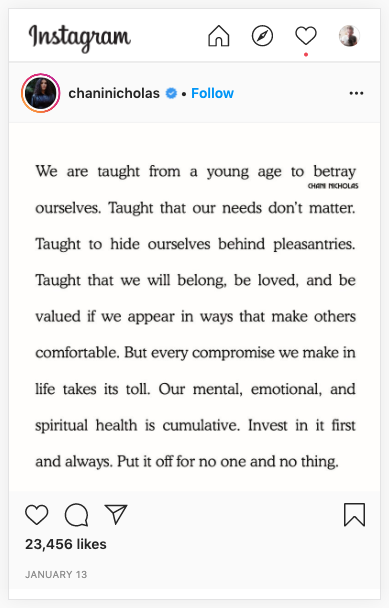
Then there was her first horoscope for 2020: Jupiter and Saturn will come together for the first time in 20 years, and since the 1800s this convergence has happened in earth signs. “Thanks to the institutionalization of white-supremacist, patriarchal, colonialist capitalism that set the stage for this age, excessive waste has been celebrated up until now,” Chani wrote. Though she’s now become a brand, Chani considers herself first and foremost a writer, and that’s how she still spends the bulk of her days: writing horoscopes and pondering.
This all resonated with Candace Kita, the cultural strategy director at the Asian Pacific Islander Network of Oregon. Kita was originally skeptical of astrology, but she reconsidered it after the political upheaval of 2016. Chani “offered a new way to look at the internal narrative that I had fashioned around who I was, what my role was in the world and how I should be,” she tells me. “That really helped build a community for me, not only in terms of people, but also with folks who shared my values.
“I hadn’t seen anyone else pair astrology with social justice,” she adds. “The apolitical nature of astrology didn’t appeal to me.”
Kita got so into Chani’s work and astrology more broadly that she has actually became a professional astrologer. She now runs Astroradicals, a business that offers astrological readings that “cultivate liberation, empowerment, and radical possibility.”
Jasmine Brock also started following Chani shortly after Trump’s election. At the time she was a second-year law student. Today, as a public defender in Brooklyn’s family court system, her work often involves parents who are fighting for custody of their children. “I get really wrapped up into things,” she says, “but [astrology] reminds me to take care of myself because the truth is that if I’m not in a good place, there’s no way that I can help any parent that I’m working with.”
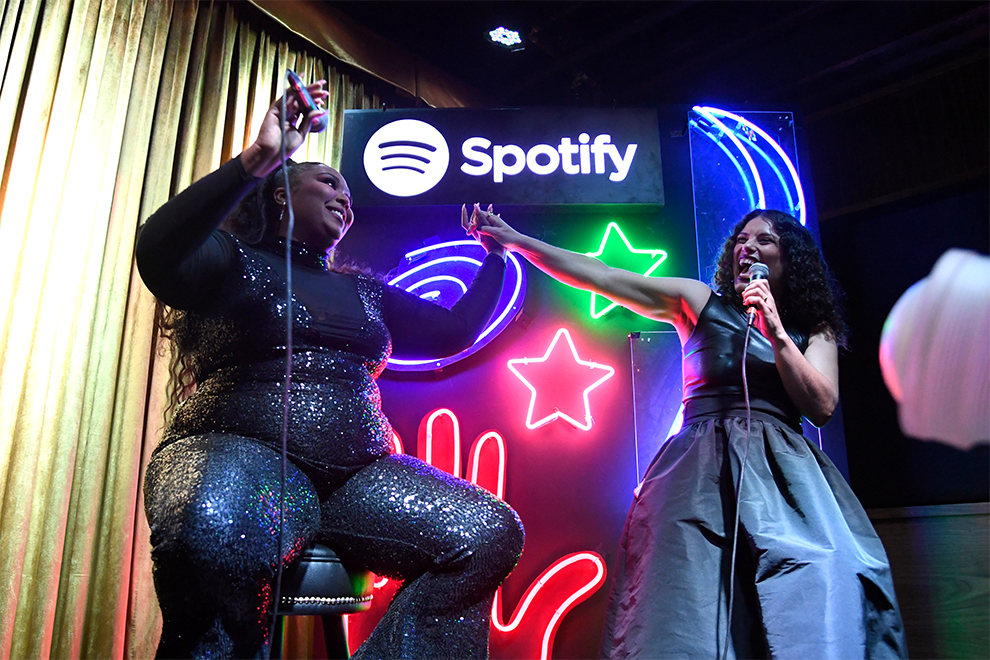
Lizzo and Chani Nicholas speak onstage during the Spotify Cosmic Playlist launch event in January 2019 in Los Angeles
Frazer Harrison; Getty
Chani’s book tour for You Were Born For This drives home how significant a player she has become in the market of astrology-curious or -devoted activists: Not long after the event with Tourmaline in Brooklyn, she was in Oakland, co-hosting a reading slash book event with Fania Davis, a well-respected restorative justice activist who is also Angela Davis’ sister. She knows her crowd.
Now, in this moment, Chani is doing her best to channel this knowledge into serving her audience in a new way: walking the line between what might be helpful in this age of fresh uncertainties, and what might just add to everyone’s peaking anxieties.
“Sometimes when we frame things astrologically, we’re also framing them in a time frame,” Chani tells me. “A beginning, middle, and end. So to remember that this is just a moment, and we will get through it, and we will be changed by it, but it won’t be forever.”

I press Kita to understand what about Chani’s work and the larger field of astrology really, deep-down appealed to her. “It started to make sense to me,” she says, “that astrology was a way that I would rewrite and re-examine the story I’d been telling about myself.”
And that’s when something clicked for me.
What I want isn’t the Chani story, but my own. That’s what I was so embarrassed about before Molly stepped in. Of course, selfishness is always at play somewhere in our work, but we—millennials, journalists, queer people of color who dabbled in community organizing—are not conditioned to acknowledge it. Instead, we look at the collective. The team. The community. What of my story can be of service to others?
But selfishness and self-awareness are two different things. Sometimes it’s okay to want a space that’s all our own.
Right now medical professionals and, increasingly, local governments are telling people to stay home in order to stay safe. Even if you’re not showing symptoms, the fact that you could pass along the virus to someone else for whom it could prove deadly is a wake-up call unlike any we’ve seen in modern history. Now, taking care of yourself, creating your own space, isn’t just a social luxury. It’s a matter of public safety.
While we can be so focused on the world outside ourselves, Chani provides the opportunity to look in, and at each other, and realize we’re not alone. And while there’s much we can’t change, it’s how we respond to the world—whether it’s a healthy one, an infected one, an uncertain one—that matters.
I of course do not realize any of this on that January Friday in the lobby, when Chani finally takes out her phone and pulls up my chart on her website. She tells me I’m a Capricorn rising with a sun in Leo, which means, in short, that I work hard and want to be acknowledged for it. I nod. I find great satisfaction in making lists. It’s what makes me feel seen. I make them before bed and when I wake up. When I’m on the train to work and once I get to the office. It’s a small thing that I’d never paid all that much attention to until recently.
Then Chani takes that pause and she tells me that my Leo is in a house associated with loss, grief, and anguish. And I don’t just feel seen. I feel exposed.
I laugh, because that’s what I do when I’m uncomfortable. It’s true that in one decade nearly half of my family died. A shooting, a fire. A bad heart. A bad breast. I’ve often carried the cumulative grief of those losses like an overstuffed bag on the beach of life. Everyone’s running around in the sand, weightless. And then there’s me, lugging around all my dead. I can trace my desire to be a writer back to high school, when my mother was featured on the front page of my hometown newspaper, urging witnesses to come forward with information in a family member’s murder. That was part of the story, I thought then. But there was a different story to tell, too, of people who were always the subjects but never protagonists.
Chani tells me that societies once dealt better with death, but we’ve since sanitized it. “Your chart speaks to remembering or knowing it in a way,” she says. “And so something about your work brings that knowledge through and is so necessary and needed.”
I’m not sure if that’s what I wanted to hear, but I did feel a helluva lot less alone listening to it.
